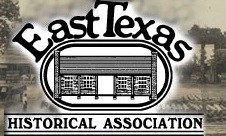As you read this article, I will be driving down US Highway 69 from my home in Greenville, Texas, to Stephen F. Austin University in Nacogdoches, Texas. I’m heading to the Fall Conference of the East Texas Historical Association. There I will visit with old friends, meet new friends, listen to some very good speakers, and in general have a great time.
I have been a member of the organization since 2005. I definitely enjoy everything about the group. But, you ask, what do we do? We certainly do more than enjoy a fall gathering in the Piney Woods of East Texas. Sometimes we go to Galveston. In the spring, we gather at various old towns in the region.
First of all, let me explain that historians are not all history professors. While I did teach elementary school early in my career, I have never lectured in a college classroom. That’s just not my thing.
I worked for almost twelve years as the librarian in our local history and genealogy collection at the W. Walworth Harrison Public Library. I learned how to preserve old documents, records, and photographs. Thanks to modern technology, most of these papers can now be scanned and digitized to prevent future damage from both natural and artificial light. Continuous handling damages these fragile keys to our past.
I was able to take a shoebox of old papers, photos, and sometimes bugs and end up with a nicely organized collection of memories. Of course, I now publish a blog twice a week, post an event from a Century Ago on Facebook, and am now writing my third book. But what do other historians do?
Many are college professors and high school history teachers. I know very few that are not passionate about their subject. Some are genealogists. I do a little family history, mostly of my family. In fact, I will make a presentation this Friday on how genealogy and history can work together. Both are vital to each other.
I know several historians who work in archives. They are fantastic, whether they work at local libraries, state archives, and with land records. They know their stuff, believe me. One gentleman I once met became the Marine Corps historian after writing an in-depth dissertation regarding an Army-Air Corps training base in Texas. At the time he wrote it, the Department of Defence was somewhat careful who read their records.
Other historians have a fascination for cemeteries, old homes, and all historic places. Some of them work for the state historical commission, while others teach Public History in colleges and universities. This is a fairly new field, but one with lots of exciting happenings. Stephen F. Austin University has a great program in Public History. They are active in Nacogdoches preservation.
Many museums have historians on staff. You may not see them, but behind the scene they are interpreting live in the past for us.
Finally a historian doesn’t have to have a job in a history field. There are many opportunities for re-enactors, preservation advocates, cemetery hunters and many more. If you are interested, look around your community. There’s a special nook just waiting for you.

